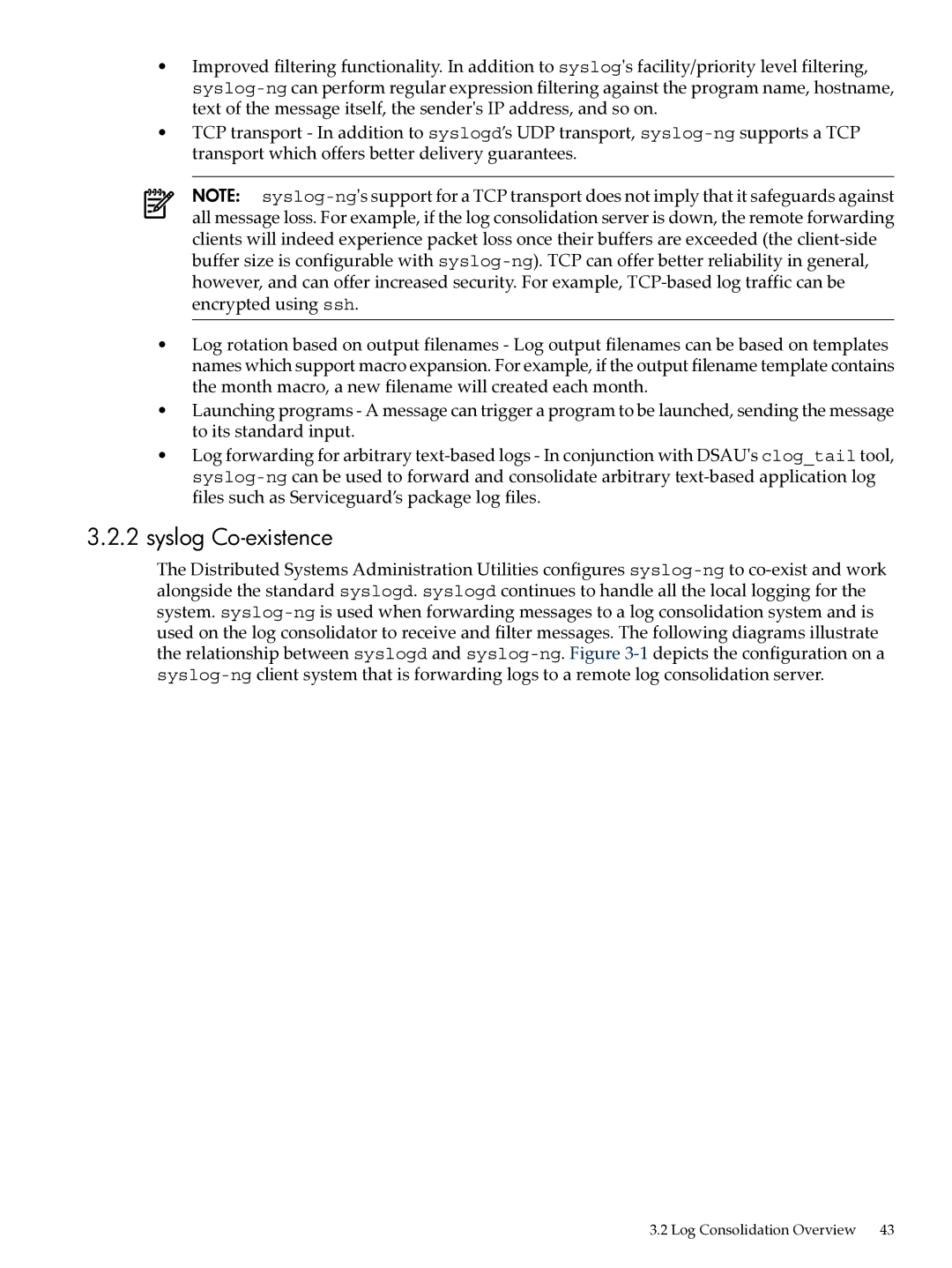Distributed Systems Administration Utilities Users Guide
Copyright 2009 Hewlett-Packard Development Company, L.P
Table of Contents
HP-Supported Open Source pdsh Options Index
List of Figures
Syslog-ngLog-Forwarding Configuration
Target Node Error Messages
Consolidated Logging Commands
List of Tables
Related Information
About this Document
Intended Audience
Typographic Conventions
Product Support HP Encourages Your Comments
Introduction
Command Fanout Commands
Distributed Systems Administration Utilities Commands
Configuration Synchronization Command
Consolidated Logging Commands
Open Source Components
Utility Setup Command
Open Source cfengine Commands
Open Source pdsh Commands
Open Source syslog-ng Command
Distributed Systems Administration Utilities Manual Pages
Dsau Manual Page Sections
Cfengine Overview
Configuration Synchronization
Configuration Synchronization
Cfengine Daemons and Commands
Cfengine Overview
Cfengine Master Server Deployment Models
Using the Configuration Synchronization Wizard
Configuring cfengine
# /opt/dsau/sbin/csyncwizard
Configuration Data for csyncwizard
Wizard displays the following introductory screen
Wizard proceeds to configure the system as a master server
# /opt/dsau/sbin/csyncwizard
Configuration Synchronization
Configuring cfengine
Would you like to manage clients? N
Serviceguard Automation Features
Cluster Configuration Notes for cfengine
Var/opt/dsau/cfengine/inputs directory
Opt/dsau/bin/csyncdispatcher Memberadded newhost
Using the Wizard to Configure a Synchronization Client
When prompted, enter the name of the client to add
Manual Configuration
Start by creating the directory
Manually Configuring a Standalone Synchronization Server
# mkdir -p /var/opt/dsau/cfenginemaster/inputs
# cp localhost.pub root-10.0.0.5.pub
# /opt/dsau/sbin/cfkey # /var/opt/dsau/cfengine/ppkeys
# cfrun -v -- --verbose
# /sbin/init.d/cfservd start
# cfagent --no-lock --verbose --no-splay
# cfrun -- --inform
# mkdir -p /csync/dsau/cfenginemaster/masterfiles
Initial Serviceguard Package Preparation
List Managed Clients in cfrun.hosts
Policyhost = csync.abc.xyz.com
# /opt/dsau/sbin/cfkey
Edit the cfservd.conf File
# cexec /sbin/init.d/cfservd start
# ccp /etc/rc.config.d/cfservd /etc/rc.config.d/cfservd
# cp localhost.pub root-192.10.25.12.pub
# ccp * /var/opt/dsau/cfengine/ppkeys
# cmapplyconf -P csync.conf # cmmodpkg -e csync
Test the configuration by performing the following steps
# ccp csync csync.conf /etc/cmcluster/csync
Apply the package and start it
On a managed client, use the command
Configuring a Synchronization Managed Client
Choosing a Synchronization Invocation Method
Security Notes
Encryption Checksum alerts
Key Exchange
Csync Network Port Usage
Encryption
# /sbin/init.d/cfservd stop
Disabling Use of cfengine
Logging Options
Checksum Alerts
Unable to connect to a cfengine client or master
Cfengine Troubleshooting
Syntax error due to missing or superfluous spaces
#cfagent -K
Cfagent -d, -d1, -d2, or -d3 cfservd Cfrun
2describes syslog Facilities Messages
Consolidated Logging
Introduction to syslog
Syslog Message Format
Message Filtering
Log Consolidation Overview
Improved Log Consolidation
Syslog Co-existence
Etc/cmcluster/package-name/package-name.log
Syslog-ng Log Consolidator Configuration
Log Consolidation Configuration
Configuration Data for clogwizard
Using the Log Consolidation Wizard
Opt/dsau/sbin/clogwizard
Answer yes y or press Enter. The next question is
Where N is the expected number of clients
Answer yes y. The wizard then prompts
If these choices are correct, continue
Next prompt is
Log files that reside on this cluster can be consolidated
Consolidated package logs would be located here
Cluster Configuration Notes for clog
Minimizing Message Loss During Failover
Or press Enter. The next question is
Configuring a Log Forwarding Client Using clogwizard
Enter the ssh port to be used for port forwarding
Manually Configuring a Standalone Log Consolidation Server
Manually Configuring Log Consolidation
Replace the %UDPLOOPBACKLOG% token with
# /sbin/init.d/syslogd stop # /sbin/init.d/syslogd start
For example, for TCP
Add the following lines
Create the following symbolic link
Change the Clogconfigured line to
If using the TCP protocol, add
Log Consolidation Configuration
SYSLOGDOPTS=-D -N
KEEPALIVE% tokens with appropriate values
UDPLOOPBACKSOURCE% and %UDPLOOPBACKLOG% tokens
Creating the clog Package
If consolidating package logs of this cluster, add
If using VxVM, comment out the LVM Volume Group line
Distribute it cluster-wide
Testing and Starting the clog Package
Then use cmviewcl to make sure it is running
Using VxVM Instead of LVM
Manually Configuring Log Forwarding Clients
Manually Configuring a Standalone Log Forwarding Client
Ln -sf /etc/syslog-ng.conf.client /etc/syslog-ng.conf
# /sbin/init.d/syslog-ng start
# cpp /etc/rc.config.d/syslogd /etc/rc.config.d
Destination dsyslog%TYPE% %TYPE%%IP%port%PORT%
Create the following symbolic link on each cluster member
If using the TCP protocol, add the following lines
If using ssh port forwarding, add
Otherwise, if using the UDP protocol, add
Forwarding Ascii Log Data
Start syslog-ngon all cluster members using
For the filter line
For the destination line
For the log line
Consolidating Package Logs on the Log Consolidation Server
#/sbin/init.d/syslogd stop
Perform the following steps to disable log consolidation
Disabling Log Consolidation
Disabling a Standalone Log Consolidation System
# /sbin/init.d/syslog-ng stop
Disabling a Serviceguard Cluster Log Consolidation System
Disabling a Standalone Log Forwarding Client
#/sbin/init.d/syslogd start
#/sbin/init.d/syslogd stop #/sbin/init.d/syslogd start
Disabling a Serviceguard Cluster Log Forwarding Client
Log File Protections
Securing Consolidated Logs
Ssh Port Forwarding
Clog Network Port Usage
Using Bastille to Harden the System
# cd /opt/ssh/etc # ccp sshhost* /opt/ssh/etc
To log in to the System Management Homepage, navigate to
Using the System and Consolidated Log Viewer
Viewing System and Consolidated Logs
Starting System Management Homepage
Viewing System and Consolidated Logs
Page
Parallel Distributed Shell
Command Fanout
Cwall displays a wall1M broadcast message on multiple hosts
Pdsh Utility Wrappers
All nodes
Systems
# csshsetup -r -f memberslist.txt
Security Configuration
Remote Shell Security Setup
Ssh Security Setup
Target Node Error Messages
Command Fanout Troubleshooting
Ssh Command Messages
Rsh Command Messages
HP-Supported Open Source pdsh Options
Page
Cfanouthosts
Index
LVM
UDP

